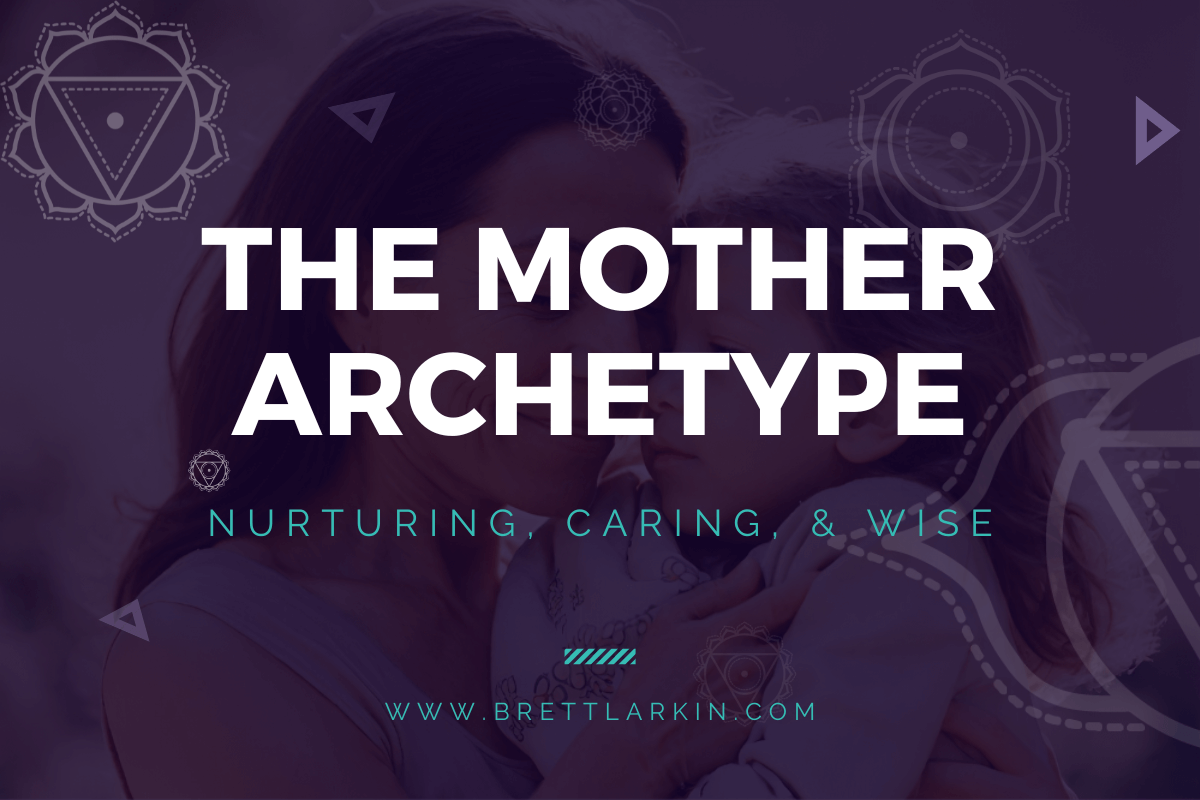In the cycle of female archetypes, one of the biggest transitions is shifting from Maiden to the Mother archetype.
In fact, the mother archetype can be found everywhere in human consciousness – from pop culture to the virgin Mary mother of god to a fairy godmother. Mother symbols are everywhere and all human beings crave motherly energy and motherly love in their life
The transition from one to the other marks a profound shift, marked by a deepening sense of empathy, as the focus shifts from your individual aspirations to fostering and supporting the well-being of others, whether you become a biological mother or not.
When you step into the role of mother, you embrace new roles and responsibilities, infused with the wisdom gained from navigating the complexities of relationships and the evolving dynamics of family life.
Our collective unconscious already has an idea of what it means to be a mother, but what do the four major female archetypes have to say about this stage…
What Is The Mother Feminine Archetype?

The Mother archetype in feminine psychology and feminine archetypes represents nurturing, caregiving, and the embodiment of maternal instincts and wisdom.
She symbolizes the capacity to create, nurture, and sustain life, whether in the literal sense of bearing children or in the broader sense of caring for others and fostering growth and well-being.
The Mother archetype embodies compassion, empathy, patience, and unconditional love. She is often associated with the Earth Mother or nurturing goddess figures in various mythologies, symbolizing fertility, abundance, and the cycle of life.
This archetype also encompasses the roles of protector, healer, and guide, providing a stable and nurturing presence that supports the emotional, physical, and spiritual needs of others. When exploring female character archetypes, Mother is the most common.
Mother Archetype Characteristics
The Mother is characterized by its profound capacity to nurture, protect, and guide others with unconditional love and empathy.
Her core qualities include:
Deepest Desire: The Mother’s deepest desire is to nurture and protect, creating a harmonious environment where love and support flourish, fostering growth and well-being in her loved ones. In your own story, you can probably identify the people you wish to protect.
Goal: Her goal is to provide unconditional love and guidance while creating a stable and nurturing home environment. She strives to foster resilience and happiness in her children and family members, contributing positively to their development and the broader community.
Deepest Fear: The Mother fears failing to protect or support her loved ones adequately, and the thought of harm coming to her children or family members deeply unsettles her. She also fears not being able to meet the emotional or practical needs of those who rely on her.
Signature Move: Known for her selfless acts of love and sacrifice, the Mother’s signature move involves nurturing and caring for others with boundless compassion and patience. She maintains a steadfast presence, offering comfort and guidance during times of difficulty.
Hidden Talent: Her hidden talent lies in her intuitive understanding of others’ needs and emotions, allowing her to provide empathetic support and guidance that profoundly impacts those around her. Her ability to create a nurturing and supportive atmosphere fosters emotional security and growth in her family and community.
Here are the main characteristics that are essential to understanding and embodying the Mother archetype:
Nurturing Presence
The Mother archetype radiates a nurturing presence, providing comfort, security, and unconditional love to those around her. She instinctively cares for others’ well-being, fostering growth and offering guidance with patience and compassion.
Protective Instincts
She possesses strong protective instincts, ensuring the safety and security of her loved ones. This includes creating a supportive environment where individuals can thrive and feel emotionally secure. Think big Mama Bear energy.
Wisdom and Guidance
The Mother archetype embodies wisdom gained from life experience, offering guidance and support based on a deep understanding of human nature and the complexities of relationships. Her advice is often grounded in empathy and practicality, helping others navigate challenges and find emotional balance.
Nurturing Creativity
She nurtures creativity and growth, not only in her children but also in herself and those around her. This may manifest in encouraging artistic expression, fostering intellectual curiosity, or supporting personal development initiatives.
Selfless Love
Above all, the Mother archetype exemplifies selfless love, often placing the needs of others before her own. Her love is unconditional and enduring, serving as a pillar of strength and stability in times of joy and adversity alike.
These characteristics distinguish the Mother archetype from others by highlighting her role as a caregiver, nurturer, and source of enduring love and wisdom within families and communities.
Mother Archetype Strengths

The Mother archetype embodies profound strengths that center around nurturing, wisdom, and compassion, essential for fostering growth and well-being:
- Unconditional Love: She offers unwavering love and support, embracing others without judgment and providing a sense of security and belonging.
- Nurturing Guidance: Possessing innate wisdom, she offers nurturing guidance rooted in life experience and empathy, helping others navigate challenges with compassion and insight.

- Emotional Resilience: Demonstrating emotional resilience, she remains steadfast in her support and care, offering stability and strength during times of uncertainty or difficulty.
- Empathy and Understanding: She deeply understands and empathizes with others’ emotions, creating a safe space for emotional expression and healing.
- Generosity and Sacrifice: Often putting others’ needs before her own, she exemplifies generosity and self-sacrifice, prioritizing the well-being and happiness of her loved ones above all else.
These strengths collectively empower the Mother archetype to nurture and shape the lives of those around her, fostering deep connections and guiding others towards personal growth and fulfillment.
Mother Archetype Weaknesses

While embodying nurturing and compassionate qualities, the Mother archetype also faces specific challenges and weaknesses inherent to her caregiving role:
- Overprotectiveness: Due to her strong nurturing instincts, she may become overly protective, which can inhibit the independence and growth of those she cares for.
- Self-Sacrifice: Often prioritizing the needs of others, she may neglect her own well-being and personal aspirations, leading to feelings of burnout or unfulfillment.
- Boundary Issues: Struggling to maintain boundaries, she may find it difficult to separate her own emotions and needs from those of others, resulting in emotional exhaustion or resentment.
- Fear of Loss: The Mother archetype may fear losing her loved ones or failing to meet their expectations, which can lead to anxiety or overcompensation in her caregiving efforts.
- Difficulty Letting Go: As her children or loved ones grow independent, she may struggle with letting go of control or accepting their evolving roles, causing friction in relationships or emotional distress.

These weaknesses, while stemming from her deep love and dedication, highlight the challenges of balancing caregiving responsibilities with personal boundaries and self-care within the Mother archetype role.
Awaken Your Feminine Energy with my Somatic Self Healing Masterclass (usually $67) FREE👇

FREE Feminine Form Embodied Yoga Masterclass (usually $67) Unleashing Pleasure + Intuitive Movement on the Mat

The Mother Archetype Examples

When you’re embodying Mother archetype, you might start your day by ensuring everyone around you is cared for, preparing nourishing meals, and organizing activities that foster unity and well-being. You prioritize creating a warm and nurturing environment for your loved ones, offering emotional support and guidance throughout the day.
Characters like Molly Weasley from the Harry Potter series exemplify Mother archetype energy with their loving and protective nature, fierce loyalty to family, and unwavering support for their children and loved ones. Oprah Winfrey, known for her philanthropy, mentorship, and compassionate advocacy for social causes, also embodies Mother qualities through her nurturing impact on countless individuals and communities.

In mythology, Demeter, the Greek goddess of agriculture and motherhood, embodies Mother archetype energy. She symbolizes the nurturing aspects of the Earth, providing sustenance and fertility to all living beings. Similarly, Isis from Egyptian mythology is revered as a maternal figure, known for her protective nature, wisdom, and ability to heal and nurture both physically and spiritually.
In pop culture, you’ll recognize the mother archetype in these characters:
- Marmee March (Little Women)
- Marge Simpson (The Simpsons)
- Catelyn Stark (Game of Thrones)
- Mrs. Gump (Forrest Gump)
- Elastigirl/Helen Parr (The Incredibles)
- Morticia Addams (The Addams Family)
- Clair Huxtable (The Cosby Show)
- Lucille Bluth (Arrested Development)
- Daenerys Targaryen (Game of Thrones, as the “Mother of Dragons”)
- Joyce Byers (Stranger Things)
- Nemo’s Mom (Coral) (Finding Nemo)
These examples illustrate how Mother archetype energy manifests through daily actions, influential figures, and mythological symbolism, emphasizing the universal themes of nurturing, protection, and unconditional love that define this archetype.
The Shadow Side of the Mother Archetype
The Mother archetype is revered for its nurturing, caring, and protective qualities.
However, like all archetypes, it also has a shadow side that can manifest in less positive ways.
The shadow side of the Mother archetype includes traits we might associate with a “terrible mother” complex. Although most mother archetypes are of humble character, sometimes when their hidden desires are pushed aside and they don’t set healthy boundaries, a dark side can demonstrate these repressed areas and weak spots.
How The Mother’s Shadow Shows Up
- Overprotectiveness: Someone embodying the shadow side of the Mother archetype might become overly protective of her biological children or loved ones. This can take many forms and limit their independence and ability to grow and learn from their own experiences.
- Smothering: She may smother those she cares for with excessive attention and care, leaving them feeling suffocated and incapable of handling things on their own. Carl Jung explained this phenomenon when describing a mother figure.
- Controlling Behavior: The desire to keep loved ones safe can morph into controlling behavior, where the mother tries to dictate their choices and actions to prevent any harm or mistakes. This is one of the most common characteristics of “terrible mother figures.”
- Martyrdom: A woman might sacrifice her own needs and desires excessively, adopting a martyr complex where she feels it is her duty to endure hardships for the sake of others. Many may recognize this in their own personal mother. This can lead to burnout, resentment, and a loss of personal identity.
- Guilt and Manipulation: The shadow Mother can use guilt as a tool to keep her loved ones close, manipulating their emotions to ensure they rely on her. This is damaging to the human psyche and requires a keen understanding to overcome this shame filled aspect of the shadow mother.
Balancing the Shadow Side
Like everything, the mother has a dual nature of light and dark. Balancing the shadow side of the Mother archetype is equally important as nurturing the great personal mother side and involves recognizing these “terrible mother” tendencies and finding healthier ways to express nurturing and care, including:
Encourage Independence: Allow loved ones, especially children, to make their own decisions and learn from their mistakes. This fosters their independence and confidence. A great mother trusts their child to follow their dreams and explore the world.
Set Boundaries: Practice setting healthy boundaries that respect both your needs and the needs of those you care for.
Ensure that your caring actions are balanced and do not lead to burnout or resentment. A boundary fosters growth for every child and other women.
Self-Care: Prioritize self-care and personal fulfillment. Remember that taking care of yourself is crucial for being able to care for others effectively.
When you feel called to indulge in your dreams, do it. Don’t let the pressure of culture stop you from giving yourself the same love your give others.
Empower Rather Than Control: Focus on empowering your loved ones rather than controlling them. Provide guidance and support, but allow them to take the lead in their lives.
Every life cycle has up’s and down’s and a key aspect of being a great mother is consistency and giving just as much love on bad days as on good ones.
Communication: Practice open and honest communication with your loved ones. Discuss feelings and needs openly to ensure mutual understanding and respect.
Archetypal images of the mother show her as a kind soul, a woman who embraces every child and can handle the reality of the world. She tells wonderful stories and respects the earth. Her communication is clear and pure.
Recognize and Release Guilt: Be aware of any manipulative tendencies involving guilt and work on releasing these behaviors. Encourage a relationship based on mutual respect and love rather than obligation and guilt. Every relationship you have will flourish when you shift guilt into a different form.
Your child will thank you and you will be more rooted in reality, while unburdening your unconscious from the myth of needing to control everything and everyone. The stories you tell yourself are powerful, so choose ones that free yourself and your child from shame and guilt.
Seek Support: No woman is an island. Mothers need support too. If you find it challenging to find balance on your own, seek support from a therapist or support group.
They can provide strategies and insights to help manage the shadow side of the Mother archetype. Whatever form of help you seek, know that mothers are worth and deserving of support, just like all the archetypes.
By acknowledging and addressing the shadow side, a woman can embody the positive aspects of the Mother archetype more fully, creating healthier and more balanced relationships with those she cares for.
How To Embody The Mother Feminine Archetype

Cultivate Unconditional Love and Compassion
Embody the Mother archetype by nurturing a deep sense of unconditional love and compassion for yourself and others. Practice acts of kindness, empathy, and understanding in your daily interactions, fostering a supportive and caring environment for those around you.
Provide Nurturing Support and Guidance
Offer nurturing support and guidance to loved ones and community members. Listen actively, offer practical help, and provide emotional reassurance and stability, demonstrating a commitment to fostering growth and well-being in others.
Create a Nurturing Environment

Create a nurturing environment that promotes emotional and physical well-being. This includes maintaining a warm and welcoming home, preparing nourishing meals, and organizing activities that strengthen familial and community bonds.
Embrace Selfless Giving and Sacrifice

Embrace the practice of selfless giving and sacrifice, prioritizing the needs of others above your own when necessary. This could involve making personal sacrifices to ensure the happiness and welfare of your loved ones, embodying the nurturing spirit of the Mother archetype.
If you are ready to connect with YOUR Mother feminine energy…
If you’re ready to learn even more about the mother archetype, I want to invite you to join my Embodied Yoga Life Coaching certification + mastermind.
If you’re interested in practical somatic yoga as a way to improve your daily life and relationships, check out my Intuitive Movement: Embodied Yoga Experience.
Next Steps
- Take a deep dive into embodiment and somatic yoga with my Somatic Yoga certification program.
- If you’re interested in practical kriya yoga as a way to improve your daily life and relationships, check out my Yoga for Self Mastery course.

FREE Embodied Yoga Workshop (usually $67) Somatic Techniques & Cord Cutting Ritual

YOU MIGHT ALSO LIKE
- Kundalini for Feminine Energy: Ignite Your Creative Power and Passion
- The Best Somatic Exercises for Anger Management and Emotional Release
- Understanding What is Divine Love: Key Insights and Perspectives
- 10 Inspiring Examples of Feminine Energy to Enhance Your Life
- The Perfect Yoga Practice For Your Menstrual Cycle Energy Levels
- Yoga to Connect with Feminine Energy: 5 Transformative Practices
- The Muse Archetype: Characteristics & Challenges
- Wise Woman Archetype: Characteristics & Challenges
- The Enchantress Archetype: Characteristics & Challenges
- Leaning Into Soft Feminine Energy: Finding Balance in a Busy World
- The Healer Archetype: Characteristics & Challenges
- The Mother Archetype: Characteristics & Challenges
- The Wild Woman Archetype: Characteristics & Challenges
- The Lover Archetype: Characteristics & Challenges
- The Mystic Archetype: Characteristics & Challenges










